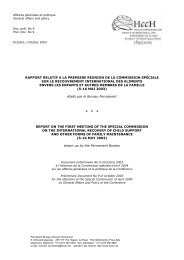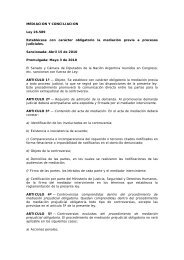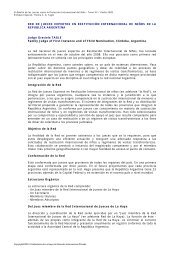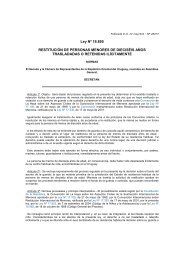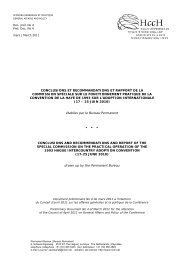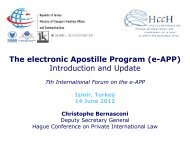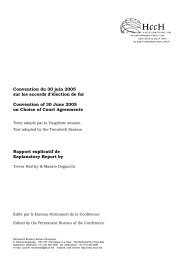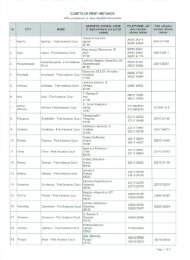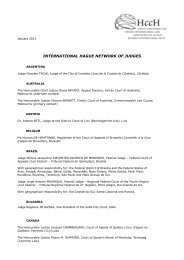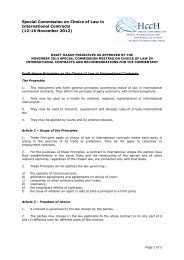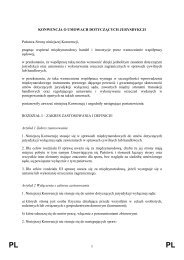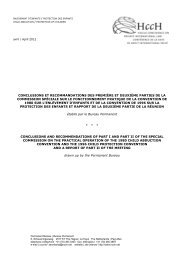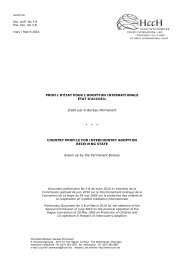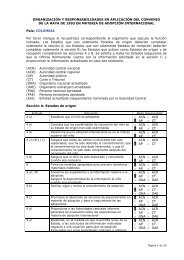aperçu des réponses au questionnaire accompagnant la ... - HCCH
aperçu des réponses au questionnaire accompagnant la ... - HCCH
aperçu des réponses au questionnaire accompagnant la ... - HCCH
Create successful ePaper yourself
Turn your PDF publications into a flip-book with our unique Google optimized e-Paper software.
Question Réponse / Reply État / State<br />
par les notifications internationales ne sont pas pris en charge <strong>au</strong> titre de l’aide juridictionnelle, en France. En outre,<br />
en droit, l’exigence par un État d’une traduction systématique ne paraît pas conforme à <strong>la</strong> Convention<br />
(art. 5(3)).<br />
We note that such a requirement is not inconsistent with Article 5(3) as that Article envisages that a Central<br />
Authority may impose <strong>la</strong>nguage/trans<strong>la</strong>tion requirement. This may be an onerous requirement if the document is<br />
lengthy and complex. We consider that the relevant provisions in the Hong Kong legis<strong>la</strong>tion (see the answer to 8.2)<br />
is an appropriate compromise between convenience and the interests of justice.<br />
Such a dec<strong>la</strong>ration could perhaps make judicial assistance more cumbersome in practice but not a substantial<br />
degree.<br />
Conformément <strong>au</strong>x dispositions de l’art. 5, l’Autorité centrale dispose d’un pouvoir d’appréciation (« l’Autorité<br />
centrale peut demander … »). Une telle déc<strong>la</strong>ration générale priverait l’Autorité centrale de son pouvoir<br />
d’appréciation et ne serait partant pas conforme à l’art. 5(3).<br />
It de<strong>la</strong>ys the forwarding of the documents for service a little, but it facilitates the performance in the foreign<br />
country, as the persons whom the documents are served are aware of their content.<br />
It makes it more expensive (trans<strong>la</strong>tion costs), but also easier for both the receiving Central Authority and the<br />
bailiff carrying out the servicing. The form is the most important factor. The fact that the form is not always duly and<br />
exh<strong>au</strong>stively completed sometimes constitutes a problem.<br />
It depends to a certain degree on the content of such a general dec<strong>la</strong>ration: were it sufficiently flexible, we<br />
would not have a problem with States making them (we suspect that, having regard at “who” has been<br />
appointed as Central <strong>au</strong>thority, in most cases it would be the Central <strong>au</strong>thority itself who would initiate such a<br />
dec<strong>la</strong>ration to be made by its government). Such a dec<strong>la</strong>ration has one clear advantage: transparency. Thus<br />
avoiding loss of precious time, should the request be returned by the CA upon receipt, for reason of trans<strong>la</strong>tion being<br />
required.<br />
In the view of the Ministry of Justice, this provision of Art. 5(3) of the Convention does not make judicial<br />
assistance in practice more cumbersome.<br />
Spain has not so far made a general dec<strong>la</strong>ration regarding the necessity to draft or trans<strong>la</strong>te all documents into<br />
Spanish. This means that, in principle, the Central Authority has the discretion to require such a trans<strong>la</strong>tion or<br />
not. Article 144 of the Spanish Procedural Law establishes that all documents drafted in a foreign <strong>la</strong>nguage must be<br />
accompanied by a trans<strong>la</strong>tion into Spanish. However, bearing in mind the superior legal hierarchy of international<br />
treaties, only if the Treaty in question states otherwise, might this obligation be avoided. In practice, the Central<br />
Authority requires a trans<strong>la</strong>tion into Spanish of all requests for service. Some exceptions have been made,<br />
considering the mother tongue of the addressee, with uneven results from the part of the judicial organs (A<br />
number of requests was forwarded to the Spanish Central Authority for service on several Norwegian nationals<br />
residing in Spain, all of them drafted in Norwegian, and without a trans<strong>la</strong>tion into Spanish. The C.A. accepted these<br />
requests, on the basis of the addressees’ mother tongue, and sent them to the competent <strong>au</strong>thority for service.<br />
Some of them were effectively served on the addressees and others were rejected by the Court, on the grounds of<br />
<strong>la</strong>ck of trans<strong>la</strong>tion). The general requirement for a trans<strong>la</strong>tion does not necessarily entail making judicial assistance<br />
more cumbersome; it just p<strong>la</strong>ces the burden in the applicant’s side. Only if the forwarding <strong>au</strong>thority<br />
justifies sufficiently that the trans<strong>la</strong>tion is not needed in a particu<strong>la</strong>r case, might the Central Authority<br />
consider the possibility of accepting the request for service in the original <strong>la</strong>nguage. However, a summary of the<br />
document should in any case be trans<strong>la</strong>ted in the official <strong>la</strong>nguage of the requested country.<br />
Would not make judicial assistance substantially more cumbersome in practice, bec<strong>au</strong>se it would be known in<br />
advance that trans<strong>la</strong>tion is needed. However, there are a number of cases where the trans<strong>la</strong>tion requirement<br />
Chine (Hongkong)<br />
Portugal<br />
Luxembourg<br />
Bulgarie<br />
Pays-Bas<br />
Rép. Slovaque<br />
Lituanie<br />
Espagne<br />
Pologne<br />
Page 26 of 69



